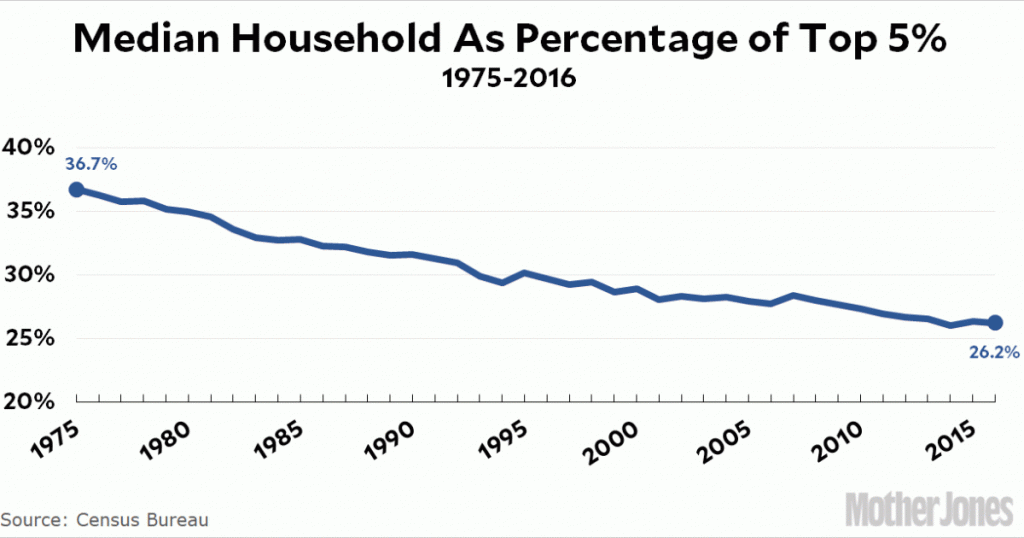Stop Thinking Small. We Can Do Better Than a Jobs Guarantee.
Looking for news you can trust?Subscribe to our free newsletters.
Why have American men slowly but steadily stopped working? To refresh your memory, here’s the chart I put up yesterday:
This is for men aged 25-54, so retirement doesn’t play a part. It’s possible that increased use of disability payments does, but not a big one. Long story short, no one knows. It’s a matter of considerable dispute, and this is one reason that I think a federal jobs guarantee is a bad idea: if we don’t even know why the employment rate has been dropping for the past 50 years, we certainly don’t know if a jobs guarantee would turn it around.
So think bigger. There are some things we do know. For example, men’s wages, which increased nicely during the immediate postwar era, have stagnated since 1973. Despite four decades of strong US economic growth, the average American man today doesn’t earn a single dime more than the average man in 1973:
There are other ways you can calculate earnings, and some them show a slightly brighter picture. But not by much. At worst, men’s wages have stagnated, and at best they’ve grown sluggishly. This is important, but I’d argue that relative wages are even more important. Here are median household earnings compared to the top 5 percent:
The top 5 percent aren’t millionaires. They’re doctors and lawyers and accountants—and the average household has fallen steadily farther behind them for the past 40 years. This is all familiar stuff. Everyone knows that income inequality has increased over the past several decades, as the middle class has stagnated while the upper middle has kept doing better and the rich have done lots better. We’ve all seen the chart:
Now, this has happened all over the world, not just in the US. Income inequality in France and Germany are about the same as here. The difference is in how we tax it. You’d think that as their incomes skyrocketed, the average effective tax rates of the rich would go up too. Needless to say, you’d be wrong:
The result is that when you include both taxes and transfers (i.e., Medicare, Medicaid, unemployment insurance, etc.), income inequality in the US is considerably higher than it is in other rich countries:
None of these other countries have job guarantees. What they have is high taxes on the affluent, which are used to pay for things that help level out inequality: universal health care, universal child care, decent unemployment benefits, and so forth. This doesn’t make them nirvana, but neither does it wreck their economies. They’re mostly doing better than we are on the employment front:
So instead of a jobs guarantee, think about this instead: how can we best smooth out the huge increase in US income inequality, which leads to a quite reasonable feeling among the working class that they’re being left behind while elites hoover up all the money? The best answer would be reforms in the market economy that made income distribution fairer, but nobody really knows how to do that. That leaves us with the second-best answer: tax the rich and use the proceeds to give money and benefits to the not-rich.
But how much should we tax the rich? Here’s a chart that at least gives you a starting point to think about this:
Since 1980, per-capita GDP has grown 85 percent. If all that growth had been shared equally, median income would also have gone up 85 percent. It hasn’t, and we all know why: because most of the money has gone to the upper middle class and the rich. If we want something fairer, we need to increase taxes on the affluent by enough to raise about $15,000 for most working adults. I’ll let others do the arithmetic. In round numbers, call it a trillion dollars or two.
The obvious candidates for this money are universal health care and universal child care. The former goes a long way toward leveling the benefits of living in a rich country while the latter makes it far easier to hold a job. But what about something that directly tackles employment? My favorite idea is job subsidies.
This is an idea that’s popular among some conservatives, and I propose to take them up on it—on an industrial scale. There are lots of different versions floating around out there, but they all share some common elements. The basic idea is to leave the minimum wage alone and allow businesses to hire people for whatever the market says they’re worth. But then the feds top up the pay. Maybe everyone gets at least $15 per hour ($30,000 per year), with subsidies then declining between incomes of $30,000 and $60,000. Or something else. I’m not too worried about the details, only the scale. The basic impulse here is simple: earnings have stagnated over the past few decades—especially for men—and if we want more people working, the best way to attract them is to pay them more. It’s the easiest way of finding out who really wants to work and who doesn’t.
A jobs subsidy accomplishes several things. First, it doesn’t change the incentives of the market. Second, it makes jobs more lucrative, which should pull a lot more people into the labor market. And third, a jobs subsidy does what government does best: it writes checks, which ordinary people then spend on whatever they want. A jobs guarantee, by contrast, does what government does worst: it specifies exactly where the money will be spent; what it will be spent on; who will get it; and what the rules are for allocating it.
Bottom line: over the past few decades, the rich have taken all this money. Let’s take it back. In the same way that Republicans compete to offer the biggest tax cut plans during primaries, Democrats should be competing to offer the biggest tax increases on the rich. That will give us all a nice, quantitative measure of just how progressive each candidate really is. And as a bonus, this is already an extremely popular position even before anyone really makes a case for it:
Finally, on a completely different note, I’d add that this is good practice for our robot future, when we’re going to have to get used to redistributing income on a huge scale as people are steadily put out of work. Why not work out the kinks now?




